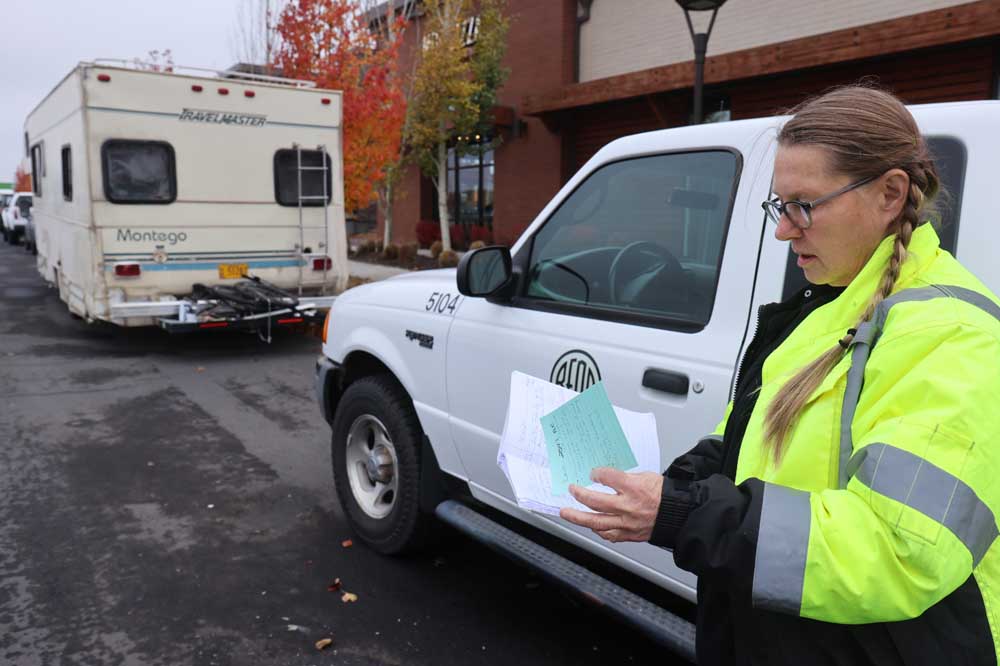Eight months in, Bend’s ‘camping code’ has moved hundreds but cited none
Published 5:45 am Friday, November 17, 2023

- Sherri Meisel, city of Bend code compliance officer, checks on an RV where people are camping in northeast Bend on Thursday.
In the more than seven months since the city of Bend passed its camping code, many people experiencing homelessness — the main target of the code — have been asked to move or clean up their belongings, but no one has been cited.
The code regulates when, where and how people can live on city rights of way.
A total of 351 people received notices to move or clean up under the code since March 1, when the code first went into effect, according to data from the city. Of that total, most, 247, were notices to move.
“We’ve issued notices to move, notices to clean. We’ve talked to folks. We’ve tried to get compliance,” Ian Leitheiser, assistant city attorney, said at a City Council meeting Wednesday.
But the city hasn’t cited anyone or sent them to municipal court for noncompliance with the code, he said.
The city began developing the code in 2022, which drew ire from activists, service providers and people who were living on city rights of way at the time.
The code, which the City Council passed by a one-vote margin on Nov. 17, 2022, also drew fervent support from many community members frustrated with the lack of available processes to deal with homeless encampments.
The code didn’t go into effect until March, and it wasn’t applied throughout the entire city until July, when the city cleared longtime homeless encampments from Hunnell Road on Bend’s northern edge.
Since people left Hunnell Road, the city has had a dearth of large-scale, long-term homeless encampments, according to Sherri Meisel, a code enforcement officer for the city.
Instead, large, long-term encampments are on the outskirts of town where the camping code doesn’t apply.
At this point, most people living on the streets know the city’s rules, she said.
“Is it perfect? Probably not. But I don’t know anything that is,” Meisel told The Bulletin. “It’s a work in progress, but it’s not the solution to houselessness.”
Under the code, people can camp on city rights of way for 24 hours, and then, once noticed, they have 72 hours to move, meaning people can be in one place for around four days at a time. After that time, people have to move their belongings at least one city block or 600 feet, and they cannot return for at least three days.
No more than three encampments are allowed per block, and people aren’t allowed to camp on city property or rights of way within 1,000 feet of shelters or Safe Parking Program sites.
People living in their vehicles are allowed to park them in one spot for up to three business days, but the camping code doesn’t specify how far people must move once they’re asked to.
While the code seems to be functioning as intended for people living in tents and makeshift structures on city rights of way, rules around vehicles have been less clear and could be subject to modification. The city might consider requiring people to move at least 750 feet, which is about two blocks, because that’s what is required in the city’s parking code.
That 750-foot requirement applies to all vehicles whether they’re being lived in or not, City Councilor Megan Perkins said at the meeting.
“That’s important to emphasize,” she said.
In July, the city’s camping code came under fire when two lawyers with the Portland-based Oregon Justice Resource Center ended up informing the city they intended to sue the city on behalf of three homeless Bend residents on the grounds that the city’s camping code is unreasonable.
Four months later, the suit has yet to be filed. One of the lawyers, Thaddeus Betz declined to comment on the city’s code.






